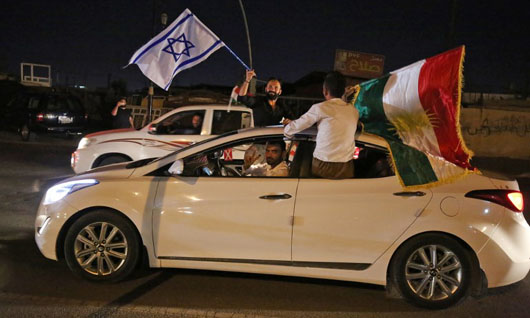by WorldTribune Staff, October 1, 2017
Iran has cut fuel oil to Iraqi Kurdistan and Turkey’s president said Israel’s Mossad was to blame for Kurdistan’s Sept. 25 vote for independence. Speaking from a secret location, the leader of Iran-backed Hizbullah said the vote was a “plot” conceived by the U.S. and Israel.
Kurds flying Israeli flags during their celebrations of the vote were proof of Israel’s involvement, Turkish President Recep Tayyip Erdogan said.

“This shows one thing, that this administration (in northern Iraq) has a history with Mossad, they are hand-in-hand together,” Erdogan said.
Speaking to Iraqi Kurds, Erdogan said, “Do you even understand what you have done. Only Israel will support you.”
Related: Kurds ignore UN warning, threats from Turkey with 9-to-1 vote for independence, Sept. 27, 2017
Erdogan threatened to cut off Kurdish oil exports. Some 500,000 to 600,000 barrels of crude oil pass to and from Kurdistan every day.
Erdogan said the vote would “drag the region into an ethnic and sectarian war.” He also threatened to halt the normalization of Turkey’s ties with Israel if Israel continued to support the Kurds’ bid for independence.
Hizbullah leader Hassan Nasrallah warned that the vote marked a first step toward the “partition” of the Middle East.
Nasrallah said “partition means taking the region to internal wars whose end and time frame is known only to God.”
Nasrallah described the referendum as part of a U.S.-Israeli “plot” to carve up the region.
The United States came out in opposition to the vote.
Iran, which fears the vote in Iraq will provoke separatists among its own Kurdish population, announced a joint military exercise with Iraq in response to the referendum.
“A joint military exercise between Iran’s armed forces and units from the Iraqi army will be held in the coming days along the shared border,” Iranian armed forces spokesman Masoud Jazayeri told reporters in Teheran.
The drills will take place at several crossings on Iran’s border with Iraqi Kurdistan, he said,
Iran also said all transport companies and drivers have been ordered to stop carrying fuel products between Iran and Iraqi Kurdistan “until further notice.”
Diesel is one of Iran’s main exports to the Kurdish region, mainly for power plants and vehicles, while the Kurds almost exclusively rely on crude and fuel oil exports to raise revenues for their oil-rich region.
Subscribe to Geostrategy-Direct __________ Support Free Press Foundation
